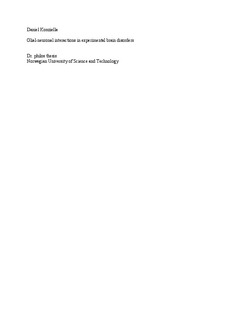| dc.contributor.author | Kondziella, Daniel | nb_NO |
| dc.date.accessioned | 2014-12-19T14:21:11Z | |
| dc.date.available | 2014-12-19T14:21:11Z | |
| dc.date.created | 2008-04-21 | nb_NO |
| dc.date.issued | 2005 | nb_NO |
| dc.identifier | 124142 | nb_NO |
| dc.identifier.isbn | 82-471-7159-7 | nb_NO |
| dc.identifier.uri | http://hdl.handle.net/11250/263994 | |
| dc.description.abstract | When [1-13C]glucose and [1,2- 13C]acetate are given simultaneously, information of astrocytic and neuronal metabolism can be obtained in the same animal. This is because acetate is exclusively taken up by astrocytes, while the major part of acetyl-CoA derived from glucose is metabolized in neurons. In the present thesis glial-neuronal interactions in experimental models of epilepsy, hydrocephalus and schizophrenia were examined by 13C NMR spectroscopy and other techniques.
Pentylenetetrazole (PTZ)-kindling mainly altered metabolism of astrocytes in 2 months old and of glutamatergic neurons in 8 months old senescence accelerated mice P8 (SAMP8), a genetic model of aging. In the presence of PTZ, phenobarbital decreased labeling of most metabolites from both [1-13C]glucose and [1,2-13C]acetate in young SAMP8, although in older animals only GABAergic neurons were affected. Phenobarbital normalized glutamate labeling from [1-13C]glucose in old PTZ animals. Aging of SAMP8 lead to decreased mitochondrial activity in glutamatergic neurons, as shown by decreased glutamate labeling from [1-13C]glucose in old control animals compared to young controls. Additionally, old SAMP8 mice had disturbed astrocytic metabolism indicated by lowered glutamine synthesis from [1,2-13C]acetate. In the early development of rat kaolin-hydrocephalus astrocyte metabolism was impaired only. First later, at the chronic stage, neuronal metabolism became affected as well. A decrease in [4,5-13C]glutamate and unchanged [4,5-13C]glutamine indicated impaired transport of astrocytic glutamine to glutamatergic neurons four weeks after hydrocephalus induction. While a single dose of the NMDA antagonist MK801 mainly disturbed metabolism in the rat temporal lobe (TE), repeated administration lead mostly to metabolic impairment in the cingulate, retrosplenial and frontal cortex (CRFC). Evidence was found for decreased neurotransmitter release from synaptic vesicles and impaired conversion of glutamine to glutamate in neurons. Moreover, MK801 lead to compartmentation of glutamine metabolism, where glutamine labeled from neuronal glutamate was handled differently than glutamine from astrocytic glutamate. Repeated MK801 administration provoked predominantly altered neuronal metabolism, while metabolism of astrocytes seemed relatively unaffected. This might add to the disturbances of the cortico-striato-thalamo-cortical loop caused by NDMA receptor blockade and hence to the sensory gating deficits provoking cortical sensory overstimulation and psychosis.
In contrast to the hydrocephalus experiment, the studies of epilepsy in SAMP8 and of NMDA receptor hypofunction did not show primary astrocytic impairment. Thus, astrocytic function differs from disorder to disorder. Although there is no general pattern of glial-neuronal interactions, the socalled glutamate-glutamine cycle is frequently disturbed. | nb_NO |
| dc.language | eng | nb_NO |
| dc.publisher | Det medisinske fakultet | nb_NO |
| dc.relation.ispartofseries | Doktoravhandlinger ved NTNU, 1503-8181; 2005:137 | nb_NO |
| dc.relation.haspart | Kondziella, Daniel; Bidar, Adbel; Urfjell, Bente; Sletvold, Olav; Sonnewald, Ursula. The pentylenetetrazole-kindling model of epilepsy in SAMP8 mice: behavior and metabolism. Neurochemistry International. 40(5): 413-418, 2002. | nb_NO |
| dc.relation.haspart | Kondziella, Daniel; Hammer, Janniche; Sletvold, Olav; Sonnewald, Ursula. The pentylenetetrazole-kindling model of epilepsy in SAMP8 mice: glial–neuronal metabolic interactions. Neurochemistry International. 43(7): 629-637, 2003. | nb_NO |
| dc.relation.haspart | Kondziella, Daniel; Qu, Hong; Lüdemann, Wolf; Brinker, Thomas; Sletvold, Olav; Sonnewald, Ursula. Astrocyte metabolism is disturbed in the early development of experimental hydrocephalus. Journal of Neurochemistry. 85(1): 274-281, 2003. | nb_NO |
| dc.title | Glial-neuronal interactions in experimental brain disorders | nb_NO |
| dc.type | Doctoral thesis | nb_NO |
| dc.contributor.department | Norges teknisk-naturvitenskapelige universitet, Det medisinske fakultet, Institutt for nevromedisin | nb_NO |
| dc.description.degree | PhD i nevrovitenskap | nb_NO |
| dc.description.degree | PhD in Neuroscience | en_GB |
